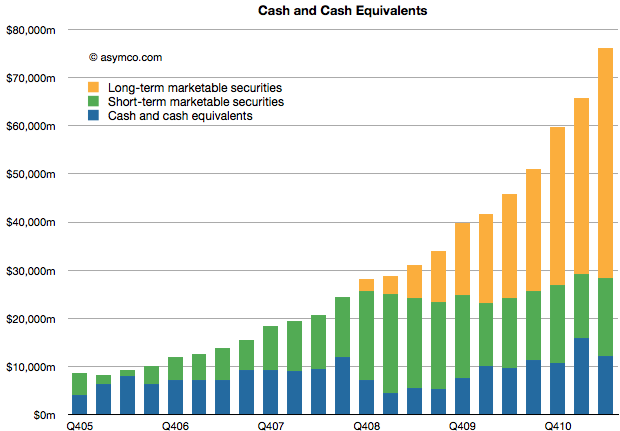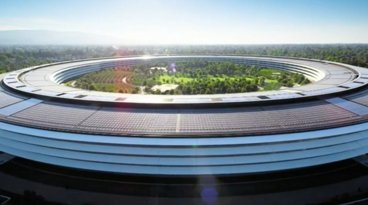At the end of 2010, Apple was sitting on $60 billion, putting it ahead of second place Microsoft ($41 billion) and third place Cisco (with $40.3 billion), according to a report by Silicon Valley Business Journal
Despite a general increase in capital improvements, mergers and acquisitions and dividend payments, Moody's said businesses' cash stashes continued to grow and their debt-to-cash ratios continue to fall, hitting 3.06 at the end of 2010, the lowest point in the last five years.
Apple doesn't pay dividends to shareholders and has avoided making lavish acquisitions in the style of Microsoft, Google and other large tech firms. This year, Apple's cash pile has swelled above $76 billion on strong sales of iPhones, iPads and Macs, as a sharp increase since 2005 as noted in a report by Asymco.
With more than half of the company's business now occurring outside the US, a large portion of Apple's cash reserves are now held in offshore accounts, mirroring the fact that $600 billion of the $1.24 trillion in cash held by US businesses in general is also sitting overseas.
That fact has prompted plans to offer US companies a "tax holiday" to encourage them to bring their foreign cash reserves back to the US, with the goal of triggering economic activity and creating jobs. Apple has joined a consortium of companies lobbying for the tax holiday.
 Daniel Eran Dilger
Daniel Eran Dilger








 Brian Patterson
Brian Patterson
 Charles Martin
Charles Martin


 Malcolm Owen
Malcolm Owen
 William Gallagher
William Gallagher
 Christine McKee
Christine McKee
 Marko Zivkovic
Marko Zivkovic









44 Comments
A report by debt rating service Moody's noted Apple held the most cash among non-financial companies in the US last year, even as businesses across the board have increased their cash holdings by about 11 percent.
At the end of 2010, Apple was sitting on $60 billion, putting it ahead of second place Microsoft ($41 billion) and third place Cisco (with $40.3 billion), according to a report by Silicon Valley Business Journal
Despite a general increase in capital improvements, mergers and acquisitions and dividend payments, Moody's said businesses' cash stashes continued to grow and their debt-to-cash ratios continue to fall, hitting 3.06 at the end of 2010, the lowest point in the last five years.
Apple doesn't pay dividends to shareholders and has avoided making lavish acquisitions in the style of Microsoft, Google and other large tech firms. This year, Apple's cash pile has swelled above $76 billion on strong sales of iPhones, iPads and Macs, as a sharp increase since 2005 as noted in a report by Asymco.
With more than half of the company's business now occurring outside the US, a large portion of Apple's cash reserves are now held in offshore accounts, mirroring the fact that $600 billion of the $1.24 trillion in cash held by US businesses in general is also sitting overseas.
That fact has prompted plans to offer US companies a "tax holiday" to encourage them to bring their foreign cash reserves back to the US, with the goal of triggering economic activity and creating jobs. Apple has joined a consortium of companies lobbying for the tax holiday.
Oh, these guys with cash would use it to create US jobs!?? Sure they would.
Oh, these guys with cash would use it to create US jobs!?? Sure they would.
The biggest American export to China is our middle class.
Apple doesn't even pay a living wage in its stores. Apple isn't going to bring back manufacturing to Elk Grove.
Oh, these guys with cash would use it to create US jobs!?? Sure they would.
Completely offtopic (boring topic anyway ) but did you see this yet? http://www.netmarketshare.com/2011/0...-s-Competition
Seems that either G-Tabs sold even worse than we thought, or at best Samsung was forced to off-load them in developing markets.
Oh, these guys with cash would use it to create US jobs!?? Sure they would.
The companies aren't asking that the foreign profits be tax free, they are asking that the tax be reduced from 35% to perhaps as low as 5% for a limited time. So even if no jobs were created, the government would get tax revenue from the incoming funds.
The amount of money that would be brought into the US under this plan could be as much as 1 trillion dollars.
Lets see, do you think it would be better for the government to get 35% of zero dollars, or 5% of 1 trillion dollars? And despite your skepticism, at least some portion of that money, if not the bulk of it, would end up helping create jobs here in the US.
-kpluck
They made the profits -- now pay the taxes or leave it offshore forever